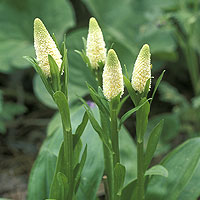False Unicorn
Uses
Parts Used & Where Grown
False unicorn is native to Mississippi and continues to grow primarily in the southern part of the United States. The roots of false unicorn are most commonly used in herbal medicine.
Our proprietary “Star-Rating” system was developed to help you easily understand the amount of scientific support behind each supplement in relation to a specific health condition. While there is no way to predict whether a vitamin, mineral, or herb will successfully treat or prevent associated health conditions, our unique ratings tell you how well these supplements are understood by the medical community, and whether studies have found them to be effective for other people.
For over a decade, our team has combed through thousands of research articles published in reputable journals. To help you make educated decisions, and to better understand controversial or confusing supplements, our medical experts have digested the science into these three easy-to-follow ratings. We hope this provides you with a helpful resource to make informed decisions towards your health and well-being.
3 StarsReliable and relatively consistent scientific data showing a substantial health benefit.
2 StarsContradictory, insufficient, or preliminary studies suggesting a health benefit or minimal health benefit.
1 StarFor an herb, supported by traditional use but minimal or no scientific evidence. For a supplement, little scientific support.
This supplement has been used in connection with the following health conditions:
| Used for | Why |
|---|---|
1 Star Dysmenorrhea Refer to label instructions | False unicorn was used in the Native American tradition for a large number of women’s health conditions, including painful menstruation. was used in the Native American tradition for a large number of women’s health conditions, including painful menstruation. Generally, false unicorn root is taken as a tincture (2–5 ml three times per day). The dried root may also be used (1–2 grams three times daily). It is typically taken in combination with other herbs supportive of the female reproductive organs. |
Traditional Use (May Not Be Supported by Scientific Studies)
The medicinal use of false unicorn root is based in traditional Native American herbalism. It was recommended for many women’s health conditions, including dysmenorrhea (painful menstruation) and other irregularities of menstruation, as well as to prevent miscarriages.1 False unicorn was also used as a remedy for morning sickness.
How It Works
Steroidal saponins are generally credited with providing false unicorn root’s activity.2 However, modern investigations have not confirmed this, and no research exists about the medical applications of this herb.
How to Use It
False unicorn root tincture, 1/2–1 teaspoon (2–5 ml) three times per day, is sometimes recommended .3 The dried root, 1/4–1/2 teaspoon (1–2 grams) three times per day, is also used.
Interactions with Supplements, Foods, & Other Compounds
Interactions with Medicines
Side Effects
No adverse effects have been reported with the use of false unicorn. Although false unicorn has been used historically for nausea and vomiting of pregnancy and to prevent miscarriages, its actions as a possible uterine tonic make its use during pregnancy potentially unsafe.
1. Mills SY. Out of the Earth: The Essential Book of Herbal Medicine. Middlesex, UK: Viking Arkana, 1991, 520-2.
2. Mills SY. Out of the Earth: The Essential Book of Herbal Medicine. Middlesex, UK: Viking Arkana, 1991, 520-2.
3. Newall CA, Anderson LA, Phillipson JD. Herbal Medicines: A Guide for Health-Care Professionals. London: Pharmaceutical Press, 1996, 116.
Last Review: 03-24-2015

Copyright © 2024 TraceGains, Inc. All rights reserved.
Learn more about TraceGains, the company.
The information presented by TraceGains is for informational purposes only. It is based on scientific studies (human, animal, or in vitro), clinical experience, or traditional usage as cited in each article. The results reported may not necessarily occur in all individuals. For many of the conditions discussed, treatment with prescription or over the counter medication is also available. Consult your doctor, practitioner, and/or pharmacist for any health problem and before using any supplements or before making any changes in prescribed medications. Information expires December 2024.
This information does not replace the advice of a doctor. Ignite Healthwise, LLC, disclaims any warranty or liability for your use of this information. Your use of this information means that you agree to the Terms of Use. Learn how we develop our content.

